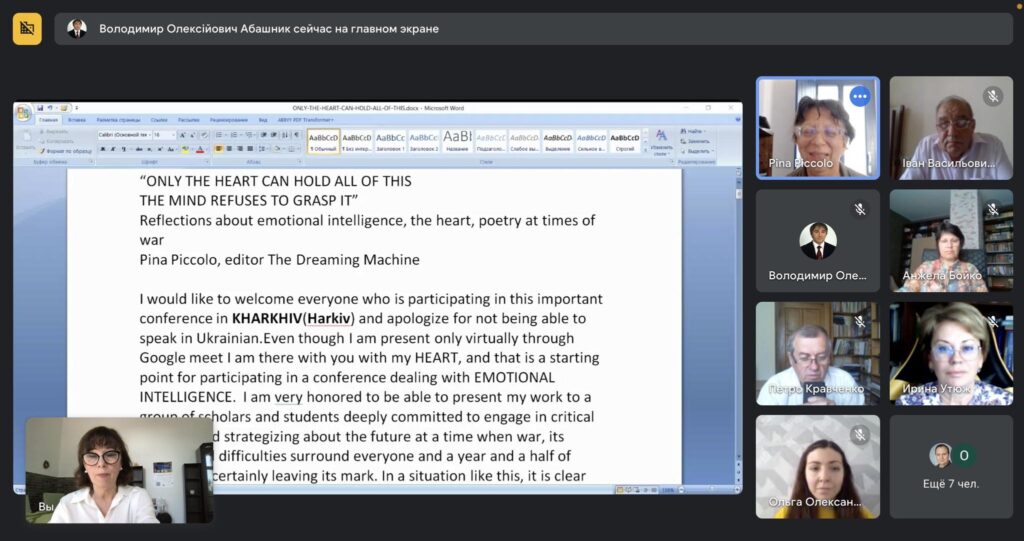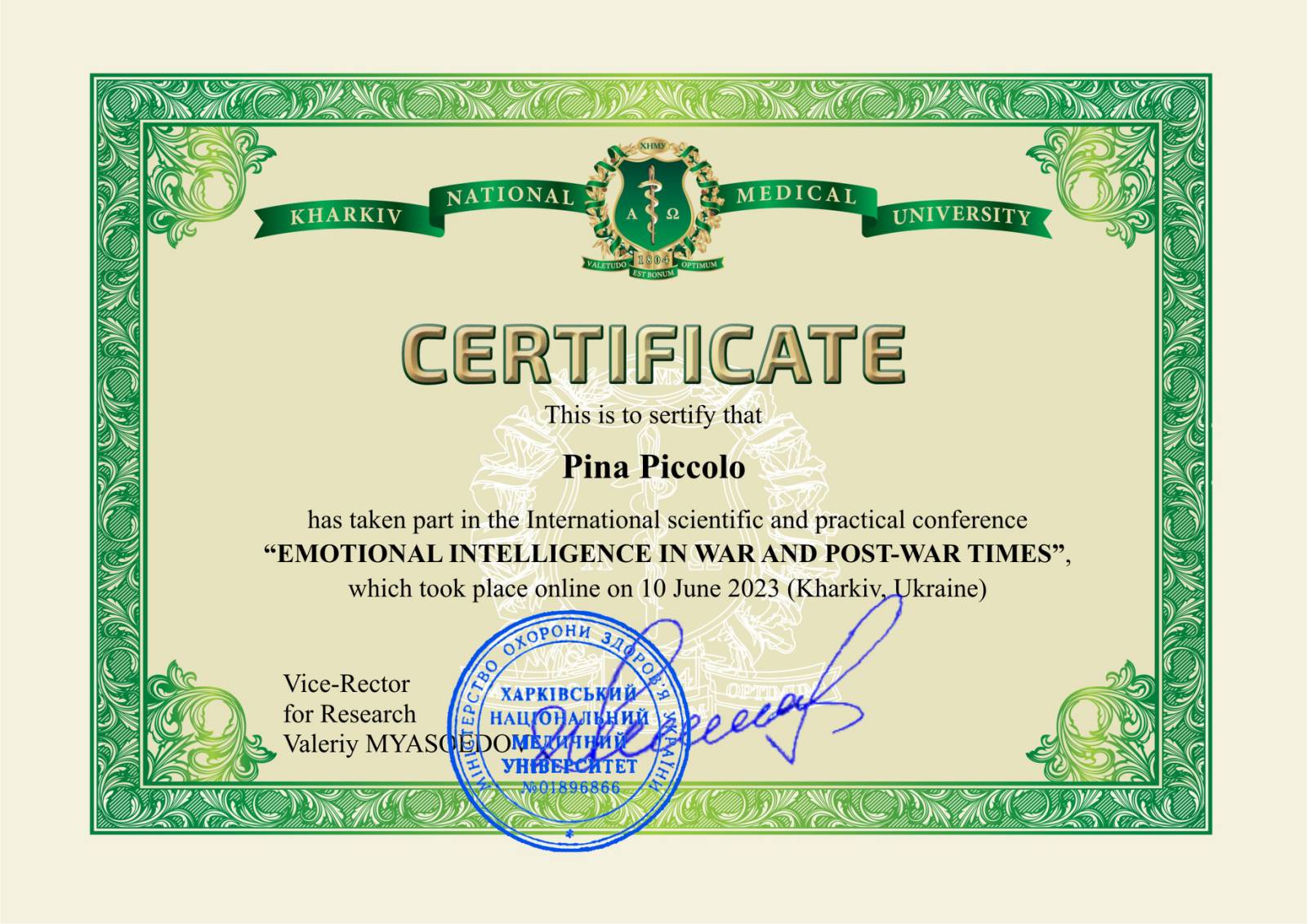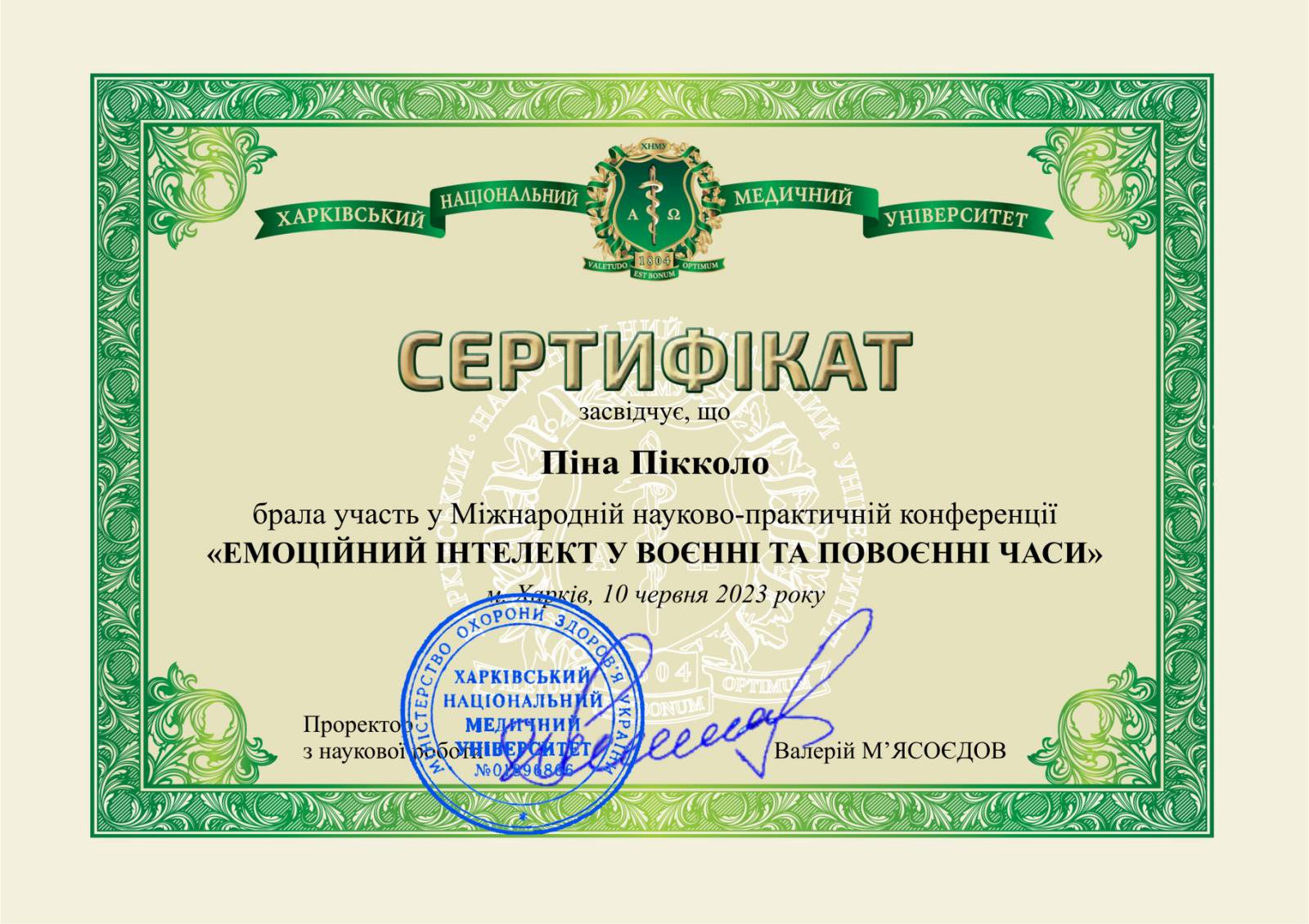”
Reflections about emotional intelligence, the heart, poetry at times of war
Pina Piccolo, editor The Dreaming Machine
I would like to welcome everyone who is participating in this important conference organized by the Kharkiv National Medical University and apologize for not being able to speak in Ukrainian. Even though I am present only virtually through Google meet, I am there with you with my HEART, and that is a starting point for participating in this conference EMOTIONAL INTELLIGENCE IN WAR AND POST WAR TIMES. I am very honored to be able to present my work to a group of scholars and students deeply committed to engage in critical thinking and strategizing about the future at a time when war, its trauma and difficulties surround everyone and a year and a half of resisting is certainly leaving its mark. In a situation like this, it is clear that large doses of emotional intelligence’ are needed, it is not some abstract, intellectual pursuit and I am very grateful to the conference organizers, especially Professor KATERYNA KARPENKO for contributing and putting together such a range of papers and reflections, a true prism of how deep thinking about how to bridge theory and practice is needed, especially in times of crises and their aftermath. For this, I deeply admire how the vast majority of the Ukrainian people, both inside and outside the country, have responded with spirited resistance in the face of difficulty. The artistic community, especially the poets and writers, which are the ones I am in touch with, have used their talents, words, physical presence internationally to arrive at the HEART of the issue, cutting through a lot ideological thinking and mental habits, especially in the West, where a lot of intellectuals and progressive people have grown accustomed to mechanically dividing the world into camps and taking sides without really analyzing the concrete situation and falling prey to propaganda which is amplified these days through the social media and the Internet. As cultural workers, in the West we have a lot of work to do to bring Europe, the anglophone world in touch with what is happening in the countries formerly dominated by the Soviet Union. There is a lot of ignorance of history, the richness of concrete situations and daily life and diversification of contexts, populations, histories, and I think literature, and especially poetry, can help bridge that gap by addressing those specific situations in a synthetic, more immediate way, with metaphors that reach directly and are accessible through the language of common, universal experience. To give you an example, here is a poem by Halyna Kruk, that crystallizes the ability of poetry to use a few words to convey a world. I will read it in Italian, from my translation based on the English translation from Ukrainian by Amelia Glaser and Yuliya Ilchuk, from the collection “A Crash Course in Molotov Cocktails, a book that was published in the US by Arrowsmith Press a few weeks ago and has just won an important prize in translation .
живиця |
якогось дня закінчиться війна
і ми усі нарешті заживемо
(о як ми всі нарешті заживемо!)
затягнемось як рани, відростемо
як культі ніг і рук, як та очна
порожня яма, де навіки темно.
покличемо загиблих. поіменно.
і всі прийдуть. і будуть так дивиться,
аж стигнутиме кров, немов живиця…
а поки що тримайся за живе
коріння глоду (глід лікує серце),
бо тільки серце уміщає все це,
а розум – відмовляється й не йме…
Resina
Un giorno la guerra finirà
e finalmente rinasceremo tutti,
oh, come rinasceremo,
guariremo come ferite,
ricresceremo come monconi
di gambe o di braccia,
come l’orbita vuota di un occhio
dove è buio per sempre
chiameremo i morti per nome
e tutti verranno
e ci fisseranno
finché il sangue non si sarà coagulato
come resina
Ma per ora tenetevi forte
alle radici del biancospino
Il biancospino cura i problemi di cuore
perché solo il cuore può contenere tutto questo
la mente invece si rifiuta di afferrarlo.
And that is where my experience has come in. I am a professional translator and cultural activist, with an academic background in literature. I lived for a long time in California and earned my degree there at the University of California Berkeley, in Italian literature, taught at the University of Santa Cruz for some years but after that mainly pursued my studies and cultural activities independently, organizing poetry readings and setting up literary journals. The next one is on June 28 in Rome at the Roman Forum. Three Ukrainian poets, Halyna Kruk, Natalia Beltchenko and Iya Kiva will be reading from their latest work accompanied with bandura and violin, played by Ukrainian Musicians EKA, Katarina Tsar’kov and Oksana Tiutiunyk.
In the past year and a half, my experience of the occupation and resistance in Ukraine has been indirect, it has come through my interaction with Ukrainian poets and writers that I have translated and promoted both in the Italian digital journal La Macchina Sognante and in the English language The Dreaming Machine, through interviews with artists like Zarina Zabrisky and art curators who have organized shows of Ukrainian painters in Italy, like Ludmila Vladova and Natalia Siassina, collaborations with writer and activist Marina Sorina, who was essential in conveying in Italian the poets’ commentaries during the readings and setting up links with the Ukrainian diaspora, when we had a tour in November that went to major cities like Milan, Rome, Bologna, Verona, Trento. As a result of that tour Marina Sorina has just translated into Italian a collection of poems by Oksana Stomina, a poet from Mariupol, and it will be available in the bookstores shortly.
If you are interested, I can send you the link to a report about the tour written in Ukrainian by Natalia Beltchenko , one of the poets http://maydan.drohobych.net/?p=131523&fbclid=IwAR0hxVFIBKwdBwka1kGEE3a6Of2azfIFGNOM2nkc1uCA3aMkUrlWjTNHg-U
In the Rome event, on June 28, Natalia will be reading poems that include a series from Ver Sacrum, poems set in the Exclusionary Zone of Chornobyl, one in particular resonates with the ecocide that continues to go on even today, with the destruction of dams and infrastructure
Десь кров тече: від злаку і до знаку
Відкритий шлях між степових річок.
Душа-блукачка вимовить подяку,
А той, що греблі рве, пришвидшить крок.
О гребелько, ma belle, закрийся, люба,
Хай випнеться вагітна глибина.
Зупинить кров один цілунок в губи,
На другому закінчиться війна.
*
Il sentiero si spalanca tra i fiumi delle steppe,
e dagli steli ai canti scorre il sangue.
L’anima vagante la sua gratitudine consegna,
si precipita il demone che le dighe distrugge.
Oh mia bella amata diga, ascolta la mia supplica:
ripristina la tua integrità, più pienamente di prima
Lascia gonfiare il futuro. Un bacio fermerà l’emorragia,
un altro bacio metterà fine alla guerra.
Here is another poem by Natalia Beltchenko , my Italian translation is based on the English translation by Amelia Glaser and Yuliya Ilchuk
Луб’янка — Іллінці
Сума смерті
в хатинці кожній згорьованій
в повітрі вдиху
Довге «у» як могильна яма
самум смерті пронісся
але самки в траві життя
народжують коників і коваликів
Довге «а» виструнчується
запліднює
Запилене
випиляне з ужитку
La somma dei decessi
in ogni casa bruciata
nell’aria un ululato
esala una “u” lunga come una fossa
i venti di morte hanno spazzato via tutto
eppure tra le erbe della vita le femmine
danno alla luce coleotteri, cavallette
una “aaa” prolungata, che accorda il suo strumento,
feconda
quel che è stato impolverato,
tagliato dall’uso della vita.
The last poet, Iya Kiva, is one I greatly admire, both for her skilled use of language, metaphor and the clear ethics that she is able to convey with emotional intelligence that appeal to the conscience of the listener, cutting through layers of ideology, misconceptions and convenient lies we tell ourselves in order to not face the complexity of reality. Again, I will read a few of the lines from my Italian translation, and make available to you the Ukrainian:
[біженці. вокзал]
1
довга дорога додому якого нема
прокладає колії дихання крізь львівський вокзал –
люди з обличчями мертвих дивляться на порожні життя
як торішні сніговики на перші квіти війни
сльози стоять в їхніх очах наче засохлий клей –
віддерти цей досвід можна хіба що разом з очима
щоби вставити в них чорні яблуні часу
що ростуть на запилених стежках їхніх долонь
дощ вітає вигнанців поштівками з родинних альбомів
на яких війна завжди сидить відразу на всіх стільцях
і посміхається пташечці смерті дірявою кулею рота
немовби на жарт який інші просто не вміють розповідати
світ роздивляється підписи до фотографій безліч разів
маріуполь гостомель ірпінь бородянка чернігів буча
ця кирилична музика висить у повітрі мов довгий вогонь
який застигає під нігтями брудною водою сорому
2
зроби лише крок смерте і ми з’їмо тебе на вечерю
іржаві бляшанки наших життів тобі не по зубах
зроби лише крок смерте і залишишся при цьому столі
мов порепана таця вкрита волоссям вільних людей
3
люди йдуть по калюжах бо немає тут інших шляхів
крім як приймати власну поразку мов хліб на вокзалі
у який волонтери кладуть ключі від майбутніх життів
якщо в нас вистачить сил глянути в очі любові
4
:війна – велика поразка культури:
шепочуть слова на обкладинках всіх книжок
але злочинів іржава травичка росте в їхніх ротах –
і мовчання бурштин збирає військо своє за щоками
5
ми вбиваємо свідчення наче цвяхи в руки та ноги дітей
як розмову нічну якої пізніше ніхто не згадає
придивися уважніше
попіл цього папірця
колись кликали Митенька
[rifugiati. la stazione]
1
la lunga strada verso una casa che non c’è più
posa i binari del respiro attraverso la stazione di Leopoli —
persone dal volto di morte osservano le loro vite svuotate
come i pupazzi di neve dell’anno scorso guardano i primi fiori della guerra
le lacrime impigliate nei loro occhi come colla secca…
il passato lo si può strappare solo insieme ai loro occhi
per piantare lì i meli sradicati del tempo
cresciuti sui sentieri polverosi dei loro palmi
la pioggia saluta gli esuli con cartoline dagli album di famiglia
dove la guerra è sempre seduta su tutte le sedie
un foro di proiettile la bocca, che sorride all’uccello della morte,
come ridendo a una barzelletta che gli altri non possono più dire
innumerevoli volte il mondo ha studiato le didascalie delle foto
mariupol hostomel irpin borodianka chernihiv bucha
questa musica cirillica rimane sospesa nell’aria come una lunga fiamma
che si secca sotto le unghie con l’acqua sporca della vergogna
2
Ancora un passo, morte, e ti mangeremo per cena
le nostre vecchie vite di latta non sono la vostra tazza di tè
ancora un passo, morte, e non lascerai mai questa tavola
come un vassoio tutto graffiato ricoperto di ciocche di capelli di persone libere
3
le persone calpestano le pozzanghere perché non ci sono altri percorsi
se non accettare la sconfitta come il pane gratis nelle stazioni ferroviarie
in cui i volontari infilano le chiavi delle vite future
se solo riuscissimo a trovare la forza di guardare l’amore negli occhi
4
La guerra è la grande sconfitta della cultura:
sussurrano queste parole su tutte le copertine dei libri
ma la ruggine erbosa dei crimini di guerra è cresciuta nelle loro bocche…
e il silenzio intrappolato dall’ambra raccoglie truppe nelle sue guance.
5
martelliamo le prove come chiodi nelle mani e nei piedi dei bambini
come conversazioni notturne che nessuno poi ricorda
guarda più da vicino
la cenere di questo pezzo di carta
un tempo si chiamava Mitenka
(4 aprile 2022)
Thank you so much, for listening to my talk, I hope some of this suggestions and meditations will resonate and stay with you.
As we say in Italy, “Buon lavoro”, a wish to do your work well, and it is desperately needed.
You may also like
-
Le ricadute ecologiche: Voci dall’Ucraina di Anna Badkhen, Iya Kiva, Zarina Zabrisky, Igor Bobyrev, Charles Digges, Oleksiy Vasyliuk
-
L’infinito ed innocente canto degli uccelli del cielo è per voi- Le più recenti poesie di guerra dall’Ucraina, dal sito Chytomo
-
Poetry Reminders For Putin Apologists Dressed in Progressive Clothes
-
COME ABBIAMO COSTRUITO LE NOSTRE CASE? / HOW DID WE BUILD OUR HOMES – Serhiy Zhadan
-
Silence, Space, Motion and Relief in Gianni Celati’s “Narratori delle pianure”


